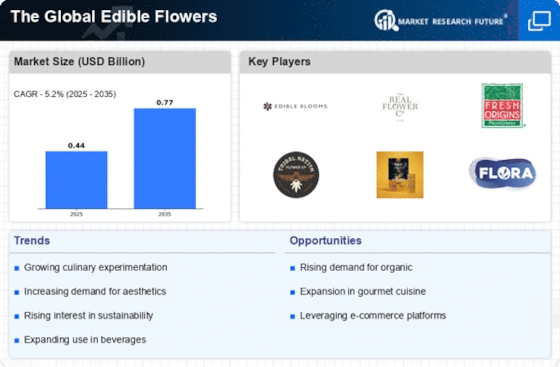Top Industry Leaders in the Edible Flowers Market
 The Edible Flowers market is witnessing significant growth globally, driven by the increasing consumer interest in unique and visually appealing food options. As the demand for edible flowers continues to riseThe competitive landscape of this market has become dynamic, with key players adopting various strategies to gain a competitive edge.
The Edible Flowers market is witnessing significant growth globally, driven by the increasing consumer interest in unique and visually appealing food options. As the demand for edible flowers continues to riseThe competitive landscape of this market has become dynamic, with key players adopting various strategies to gain a competitive edge.
Key Players:
Several key players dominate the Edible Flowers market, contributing to its growth and development. Some of the prominent players include:
- Agriver Ltd (Israel)
- Cottage Botanicals (Canada)
- Fresh Origins, LLC (US)
- Maddocks Farm Organics (UK)
- Nouvelle Fresh (South Africa)
- Herbs Unlimited (UK)
- Petite Ingredient (Australia)
- J&P Park Acquisitions, Inc. (US)
- The Edible Flower (UK)
- Nurtured in Norfolk (UK)
Strategies Adopted:
To stay ahead in the competitive Edible Flowers market, key players have implemented various strategies to enhance their market position:
Product Diversification: Leading companies are expanding their product portfolios by introducing new and unique varieties of edible flowers. This strategy helps cater to a broader consumer base and keeps the offerings competitive in the market.
Strategic Partnerships: Collaborations with distributors, retailers, and culinary influencers have become commonplace among key players. These partnerships enable companies to expand their market reach and enhance brand visibility.
Focus on Sustainability: Given the increasing emphasis on sustainable and eco-friendly practices, many key players are adopting environmentally conscious cultivation methods. This not only aligns with consumer preferences but also strengthens the brand image.
Technological Integration: Embracing technology for efficient farming practices, supply chain management, and marketing has become a key strategy. Utilizing advanced agricultural technologies ensures a consistent and high-quality supply of edible flowers.
Market Share Analysis:
Analyzing market share requires a comprehensive understanding of various factors that influence the competitive landscape. Some critical factors include:
Quality and Variety: The quality and variety of edible flowers offered play a crucial role in determining market share. Companies with a diverse and high-quality product range often attract a larger consumer base.
Global Reach: The ability to supply edible flowers on a global scale is a significant determinant of market share. Key players with extensive distribution networks and international partnerships can capture a larger market share.
Price Competitiveness: In a price-sensitive marketThe ability to offer competitive pricing while maintaining quality is crucial. Companies that strike the right balance between affordability and quality tend to secure a larger market share.
Brand Reputation: Establishing and maintaining a positive brand reputation is essential for market share growth. Consumer trust in a brand's reliability and commitment to quality can significantly impact market share.
New and Emerging Companies:
While established players dominate the Edible Flowers market, new and emerging companies are making their mark with innovative approaches and niche offerings. Some notable companies entering the scene include:
Petals & Plates: A newcomer in the market, Petals & Plates focuses on unique edible flower blends curated for specific culinary applications. The company aims to carve a niche in the market by catering to specialized consumer preferences.
Blossom Blends: With a focus on sustainable farming practices, Blossom Blends has entered the market with a range of edible flowers targeted at health-conscious consumers. The company emphasizes organic cultivation methods and transparent sourcing.
Industry News and Current Company Standing:
Staying abreast of industry news and understanding the current standing of companies is crucial for strategic planning. Recent developments include:
Supply Chain Challenges: Many key players have faced supply chain disruptions due to global factors such as climate change and the ongoing pandemic. Adapting to these challenges and implementing resilient supply chain strategies has become a priority.
Market Expansion: Several companies have announced plans for market expansion, either through acquisitions or the establishment of new cultivation facilities. This indicates a positive outlook on the market's growth potential.
Investment Trends:
Investment trends in the Edible Flowers market reflect the industry's attractiveness to investors. Some prevailing investment trends include:
Technology Investments: Companies are investing in technology solutions to enhance cultivation practices, optimize supply chain logistics, and improve overall operational efficiency.
Sustainability Investments: Investors are increasingly drawn to companies that prioritize sustainability. Edible flower producers incorporating eco-friendly practices are likely to attract more significant investments.
Competitive Scenario:
The overall competitive scenario in the Edible Flowers market is characterized by intense competition among key players, with new entrants bringing innovation and diversity to the market. The focus on quality, sustainability, and strategic partnerships will continue to shape the competitive landscape.
Recent Developments
The Edible Flowers market witnessed several noteworthy developments:
Market Consolidation: Some key players engaged in strategic acquisitions to strengthen their market presence. These consolidations aimed to combine resources and expertise for more efficient operations.
Innovative Product Launches: Several companies introduced innovative edible flower products, catering to evolving consumer tastes. These launches were often accompanied by marketing campaigns highlighting the unique features and applications of the new offerings.
Digital Marketing Emphasis: Companies increased their focus on digital marketing to reach a wider audience. Social media campaigns, influencer partnerships, and online platforms were leveraged to enhance brand visibility and consumer engagement.











